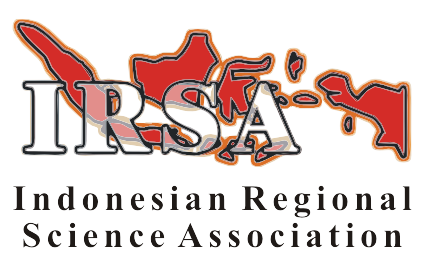The 6th IRSA International Conference
 13-14 August 2004, Jogjakarta
13-14 August 2004, Jogjakarta
The 6th IRSA International Conference
“Regional Development in Transition: Governance, Public Services, and Eco-tourism”
Chair: Catur Sugiyanto
Host: IRSA, UGM (Gadjah Mada University) and BAPPENAS
Website: www.cepps-irsa2004.ugm.ac.id
Background
The period of severe economic turmoil experienced by Indonesian economy seems to be over. Economic growth, exports and all the indicators of macroeconomic stability had turned around by August-September 2002. For many, this optimism had attracted attention, orientation, and effort to bring back the good memory of “miraculous” sustained economic growth of the 1980s and 1990s.
Many argue, however, that current and future environmental setting has become much different with the onset of decentralization, i.e. transfer of decision-making processes from the centre to the regions. In this decentralized era, it is believed that regional economic development will play a stronger role in the effort, not only to achieve rapid and sustained economic growth, but also to reshape it into more equitable economic growth that is pro-poor and poverty reducing. To this end, with decentralization, we need to understand more the appropriate role of public sector, especially the role of regional and local government.
There are five fundamental roles of the government (World Development Report, 1997) in the economy without which sustainable, shared, poverty-reducing development is impossible. Those are establishing a foundation of law, maintaining a non-distortionary policy environment, investing in basic social services and infrastructure, protecting the vulnerable, and protecting the environment. In regional economic development under the atmosphere of decentralization, the sharing of this responsibility among level of jurisdiction stills needs to be determined and discussed. However, it is expected that decentralization would lead to more effective functioning of these responsibility.
Many are aware; however, that rising regional income inequality, macroeconomic instability, and local capture are the risk we face with decentralization. These, in turn, may reduce the effectiveness of public services such as in providing education, health, infrastructure, safety nets, as well as protecting the environment. Those are fundamental services of public sector that could not be provided by private economic agents. In these areas, then public sector could assist and facilitate its private counterparts to achieve pro-poor economic growth, to gain more equitable and sustainable regional development.
The above problems need more understanding than what we currently have. This is unquestionably necessary to formulate the best strategy and policy for regional economic development in Indonesia that is now more decentralized, particularly, when we are aware that the role of governance, public services, and eco-tourism are of central importance and closely inter-related.
Objectives
The conference is intended to be a media for scholars, practitioners, and policy-makers to discuss and exchange theoretical and empirical findings on the issue of regional development and decentralization with particular emphasis on the role of public services, poverty, and the environment. It is also hoped that through this conference participants will exchange experiences and also build strong networks for future research, policy discussion, and practical collaboration.
It is expected that participants will contribute to the following regional perspective topics on (but not limited to):
• Economic growth and development
• Poverty and income inequality
• Health and education services
• Infrastructure development
• Management of water and sanitation
• Management of natural resources
• Regional and local environmental problem
• Governance and institution
• Financing aspects of regional development
Expected Participant
• Members of the Indonesian Regional Science Association (IRSA)
• Members of the Regional Science Association International (RSAI)
• Academician
• Government officials in Indonesia (Bappenas, Ministry of Home Affairs, Ministry of Finance, BPPT, and other central government entities)
• Regional government officials in Indonesia (Province/Kabupaten/Kota Bappeda, Dinas Offices, others)
• Non-Governmental Organizations
• Private sectors
• International donor communities (Usaid, AusAID, DFID, GTZ, JICA, others)
• Interested parties from other regional science and economics societies
Conference Venue
Place :
Hotel Melia Purosani
Jl. Suryotomo no. 31, Jogjakarta 55122, Indonesia
Hotel’s Website: http://www.meliajogja.com ;http://www.solmelia.com
Schedule :
August 13 and 14, 2004
Conference Organizers
The conference is jointly organized by:
• Indonesian Regional Science Association (IRSA)
• Center for Economics and Public Policy Studies, Gadjah Mada University
The structure of the organizing committee is as follows,Advisory Committee:
- Prof. Dr. Bambang Bintoro Soedjito (President of IRSA)
- Prof. Dr. Arief Ramelan Karseno (Gadjah Mada University)
- Dr. Kawik Sugiana (Master in Urban and Regional Planning, GMU)
- Dr. Budiono Sri Handoko (Gadjah Mada University)
Organizing Committee:
- Dr. Mudrajad Kuncoro* (Gadjah Mada University)
- Dr. Catur Sugiyanto (Gadjah Mada University)
- Dr. M. Masykur Wiratmo (Gadjah Mada University)
- Dr. Bambang P.S. Brodjonegoro (University of Indonesia)
- Dr. Budy P. Resosudarmo (Australian National University)
*) Chair of organizing commitee
Co-ordinator in-charge: Dr. Catur Sugiyanto
• External Affairs: M.Edhie Purnawan, MA
• Budgeting: Hengki Purwoto, M.Sc
• Conference: Tri Widodo, M.Ec.Dev
